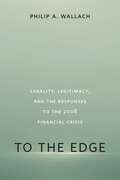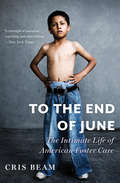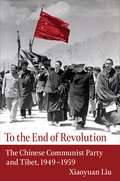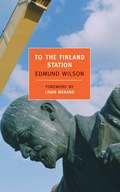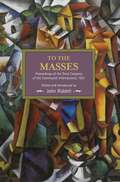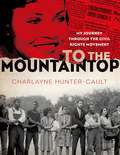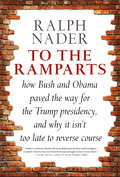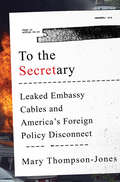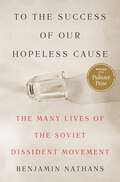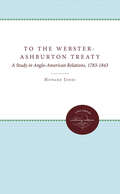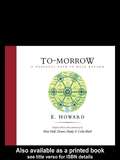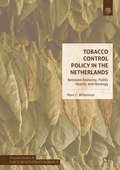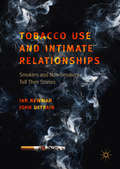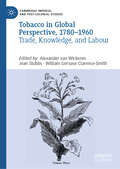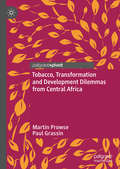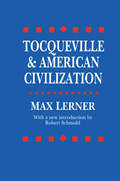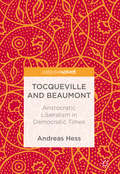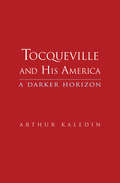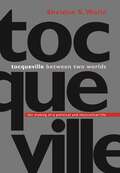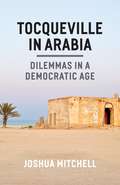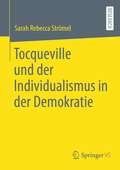- Table View
- List View
To the Edge
by Philip A. WallachWere the radical steps taken by the Treasury Department and Federal Reserve to avert the financial crisis legal? When and why did political elites and the general public question the legitimacy of the government's responses to the crisis?In To The Edge: Legality, Legitimacy, and the Responses to the 2008 Financial Crisis, Philip Wallach chronicles and examines the legal and political controversies surrounding the government's responses to the recent financial crisis. The economic devastation left behind is well-known, but some allege that even more lasting harm was inflicted on America's rule of law tradition and government legitimacy by the ambitious attempts to limit the fallout. In probing these claims, Wallach offers a searching inquiry into the meaning of the rule of law during crises.The book provides a detailed analysis of the policies undertaken--from the rescue of Bear Stearns in March 2008 through the tumultuous events of September 2008, the passage of the TARP and its broad usage, the alphabet soup of emergency Federal Reserve programs, the bankruptcies of Chrysler and GM, and the extended public ownership of AIG, Fannie Mae, and Freddie Mac. Throughout, Wallach probes the legal bases of the government's actions and explores why concerns about the legitimacy of government actions were only sporadically grounded in concerns about legality--and sometimes ran directly against them.The public's sense that government officials operated through ad hoc responses that favored powerful interests has helped bring the legitimacy of American governmental institutions to historic lows. Wallach's book recommends constructive and sensible reforms policymakers should take to ensure accountability and legitimacy before the government faces another crisis.
To the Edge
by Philip A. WallachWere the radical steps taken by the Treasury Department and Federal Reserve to avert the financial crisis legal? When and why did political elites and the general public question the legitimacy of the government's responses to the crisis?In To The Edge: Legality, Legitimacy, and the Responses to the 2008 Financial Crisis, Philip Wallach chronicles and examines the legal and political controversies surrounding the government's responses to the recent financial crisis. The economic devastation left behind is well-known, but some allege that even more lasting harm was inflicted on America's rule of law tradition and government legitimacy by the ambitious attempts to limit the fallout. In probing these claims, Wallach offers a searching inquiry into the meaning of the rule of law during crises.The book provides a detailed analysis of the policies undertaken-from the rescue of Bear Stearns in March 2008 through the tumultuous events of September 2008, the passage of the TARP and its broad usage, the alphabet soup of emergency Federal Reserve programs, the bankruptcies of Chrysler and GM, and the extended public ownership of AIG, Fannie Mae, and Freddie Mac. Throughout, Wallach probes the legal bases of the government's actions and explores why concerns about the legitimacy of government actions were only sporadically grounded in concerns about legality-and sometimes ran directly against them.The public's sense that government officials operated through ad hoc responses that favored powerful interests has helped bring the legitimacy of American governmental institutions to historic lows. Wallach's book recommends constructive and sensible reforms policymakers should take to ensure accountability and legitimacy before the government faces another crisis.
To the End of June: The Intimate Life of American Foster Care
by Cris BeamA New York Times Notable Book that &“casts a searing eye on the labyrinth that is the American foster care system&” (NPR&’s On Point). Who are the children of foster care? What, as a country, do we owe them? Cris Beam, a foster mother herself, spent five years immersed in the world of foster care looking into these questions and tracing firsthand stories. The result is To the End of June, an unforgettable portrait that takes us deep inside the lives of foster children in their search for a stable, loving family. Beam shows us the intricacies of growing up in the system—the back-and-forth with agencies, the rootless shuffling between homes, the emotionally charged tug between foster and birth parents, the terrifying push out of foster care and into adulthood. Humanizing and challenging a broken system, To the End of June offers a tribute to resiliency and hope for real change. &“A triumph of narrative reporting and storytelling.&” —The New York Times &“[A] powerful . . . and refreshing read.&” —Chicago Tribune &“A sharp critique of foster-care policies and a searching exploration of the meaning of family.&” —Publishers Weekly (starred review) &“Heart-rending and tentatively hopeful.&” —Salon
To the End of Revolution: The Chinese Communist Party and Tibet, 1949–1959
by Xiaoyuan LiuThe status of Tibet is one of the most controversial and complex issues in the history of modern China. In To the End of Revolution, Xiaoyuan Liu draws on unprecedented access to the archives of the Chinese Communist Party to offer a groundbreaking account of Beijing’s evolving Tibet policy during the critical first decade of the People’s Republic.Liu details Beijing’s overarching strategy toward Tibet, the last frontier for the Communist revolution to reach. He analyzes how China’s new leaders drew on Qing and Nationalist legacies as they attempted to resolve a problem inherited from their predecessors. Despite acknowledging that religion, ethnicity, and geography made Tibet distinct, Beijing nevertheless forged ahead, zealously implementing socialist revolution while vigilantly guarding against real and perceived enemies. Seeking to wait out local opposition before choosing to ruthlessly crush Tibetan resistance in the late 1950s, Beijing eventually incorporated Tibet into its sociopolitical system. The international and domestic ramifications, however, are felt to this day.Liu offers new insight into the Chinese Communist Party’s relations with the Dalai Lama, ethnic revolts across the vast Tibetan plateau, and the suppression of the Lhasa Rebellion in 1959. Placing Beijing’s approach to Tibet in the contexts of the Communist Party’s treatment of ethnic minorities and China’s broader domestic and foreign policies in the early Cold War, To the End of Revolution is the most detailed account to date of Chinese thinking and acting on Tibet during the 1950s.
To the Far Right Christian Hater...You Can Be a Good Speller or a Hater, But You Can't Be Both
by Bonnie WeinsteinFrom the six-time Nobel Peace Prize nominated Military Religious Freedom Foundation's official archives comes this jaw-dropping collection of hate mail, threats, and criticisms of the MRFF's efforts to ensure that all members of the United States Armed Forces fully receive the Constitutional guarantees of religious freedom to which they and all Americans are entitled by virtue of the Establishment Clause of the First Amendment.
To the Finland Station: A Study in the Writing and Acting of History
by Edmund WilsonEdmund Wilson's magnum opus, "To the Finland Station," is a stirring account of revolutionary politics, people, and ideas from the French Revolution through the Paris Commune to the Bolshevik seizure of power in 1917. It is a work of history on a grand scale, at once sweeping and detailed, closely reasoned and passionately argued, that succeeds in painting an unforgettable picture -- alive with conspirators and philosophers, utopians and nihilists -- of the making of the modern world.
To the Masses: Proceedings of the Third Congress of the Communist International, 1921
by John RiddellDebates at world Communism’s 1921 congress reveal Lenin’s International at a moment of crisis. A policy of confrontational initiatives by a resolute minority contends with the perspective of winning majority working-class support on the road to the revolutionary conquest of power. A frank debate among many currents concludes with a classic formulation of Communist strategy and tactics. This newly translated treasure of 1,000 pages of source material, available for the first time in English, is supplemented by an analytic introduction, detailed footnotes, a glossary with 430 biographical entries, a chronology, a comprehensive index, and thirty-two appendices, many never before published in any language, portray delegates’ behind-the-scenes exchanges. To the Masses represents the final installment in a decades long project to make available the proceedings of the congresses of the Communist International (comintern) held during Lenin’s time.
To the Mountaintop: My Journey Through the Civil Rights Movement
by Charlayne Hunter-Gault<p>A personal history of the civil rights movement from activist and acclaimed journalist Charlayne Hunter-Gault. <p>On January 20, 2009, 1.8 million people crowded the grounds of the Capitol to witness the inauguration of Barack Obama. Among the masses was Charlayne Hunter-Gault. She had flown from South Africa for the occasion, to witness what was for many the culmination of the long struggle for civil rights in the United States. In this compelling personal history, she uses the event to look back on her own involvement in the civil rights movement, as one of two black students who forced the University of Georgia to integrate, and to relate the pivotal events that swept the South as the movement gathered momentum through the early 1960s. <p>With poignant black-and-white photos, original articles from the New York Times, and a unique personal viewpoint, this is a moving tribute to the men and women on whose shoulders Obama stood.</p>
To the Ramparts: How Bush and Obama Paved the Way for the Trump Presidency, and Why It Isn't Too Late to Reverse Course
by Ralph Nader Jim FeastAmerica’s number one citizen Ralph Nader’s latest book shows us how unchecked corporate power has led to the wrecking ball that is the Trump presidency. Nader brings together the outrages of the Trump administration with the key flaws and failures of the previous administrations—both Republican and Democratic—that have led our nation to its current precipice. It’s all in the details and Ralph Nader knows them all. Trump didn’t come out of nowhere. Bush and Obama led the way. Writing as a Washington, DC, activist and people’s advocate for over fifty years―someone who has saved more lives and caused more impactful legislation to be enacted than almost any sitting president or legislator—Nader shows how Trump’s crimes and misdemeanors followed the path of no resistance of the Obama, Bush and Clinton regimes, which ushered in the extreme rise of corporate power and the abandonment of the poor and middle classes.
To the Scaffold: The Life of Marie Antoinette
by Carolly Erickson Lisa DrewOne of history's most misunderstood figures, Marie Antoinette represents the extravagance and the decadence of pre-Revolutionary France. Yet there was innocence about Antoinette, who was thrust as a child into the chillingly formal French court. Married to the maladroit, ill-mannered Dauphin, Antoinette found pleasure in costly entertainments and garments.
To the Secretary: Leaked Embassy Cables and America's Foreign Policy Disconnect
by Mary Thompson-JonesA former American diplomat reveals a disconnect between Washington policymakers and those who work in US embassies. When the world awoke on November 28, 2010, and read the first of the 251,287 State Department cables made public by WikiLeaks, Italian Foreign Minister Franco Frattini warned, "It will be the September 11th of world diplomacy." The WikiLeaks scandal certainly stirred tempers around the world, but it was not the implosion that many leaders expected: rather, it shed a new spotlight on the work of the U.S. foreign service. In To the Secretary, Mary Thompson-Jones explores the most fascinating and overlooked of these cables to offer an unparalleled window into the day-to-day work of U.S. diplomats, demystifying the lives of those who implement America's foreign policy across the globe. From the story of Bulgaria's Aleksi "the Tractor" Petrov to disappearing ballot ink in Ukraine, a Honduran coup d'état, or disaster relief for a devastated Haiti, To the Secretary depicts the work of ambassadors and foreign service officers through their firsthand narratives dealing with crises, corruption, and testy world leaders. Negotiating distinctly un-American customs and corridors of power, these shrewd brokers in embassies from Argentina to Zimbabwe worked tirelessly to promote American diplomacy in a world frequently hostile to the United States. To the Secretary also reveals the disconnect that diplomats face at home, guided by conflicting approaches from multiple Washington stakeholders intent on their own agenda, often unaware of realities on the ground. In an honest assessment of America's foreign policy challenges, Thompson-Jones describes the deepening gulf between decision makers in Washington and their diplomats in the field. From misinterpreted analyses of anti-Americanism to Washington's unwillingness to send resources to support diplomatic activities that could make a difference, To the Secretary shows what policymakers can learn from diplomats abroad--and how this can strengthen America's place in an unstable world.
To the Success of Our Hopeless Cause (Pulitzer Prize Winner): The Many Lives of the Soviet Dissident Movement
by Benjamin NathansWINNER OF THE 2025 PULITZER PRIZEWinner of the Pushkin House Russian Book PrizeA "riveting history" (Wall Street Journal) of the Soviet dissident movement, which hastened the end of the USSR and still provides a model of opposition in Putin&’s Russia—and beyond&“A book about a past time that is very much a book for our time. . . . A story from which we all stand to learn as we face a new wave of authoritarianism.&”—Los Angeles Review of BooksBeginning in the 1960s, the Soviet Union was unexpectedly confronted by a dissident movement that captured the world&’s imagination. Demanding that the Kremlin obey its own laws, an improbable band of Soviet citizens held unauthorized public gatherings, petitioned in support of arrested intellectuals, and circulated banned samizdat texts. Soviet authorities arrested dissidents, subjected them to bogus trials and vicious press campaigns, sentenced them to psychiatric hospitals and labor camps, sent them into exile—and transformed them into martyred heroes. Against all odds, the dissident movement undermined the Soviet system and hastened its collapse. Taking its title from a toast made at dissident gatherings, To the Success of Our Hopeless Cause is a definitive history of a remarkable group of people who helped change the twentieth century.Benjamin Nathans&’s vivid narrative tells the dramatic story of the men and women who became dissidents—from Nobel laureates Andrei Sakharov and Alexander Solzhenitsyn to many others who are virtually unknown today. Drawing on diaries, memoirs, personal letters, interviews, and KGB interrogation records, To the Success of Our Hopeless Cause reveals how dissidents decided to use Soviet law to contain the power of the Soviet state. This strategy, as one of them put it, was &“simple to the point of genius: in an unfree country, they began to conduct themselves like free people.&”An extraordinary account of the Soviet dissident movement, To the Success of Our Hopeless Cause shows how dissidents spearheaded the struggle to break free of the USSR&’s totalitarian past, a struggle that continues in Putin&’s Russia—and that illuminates other struggles between hopelessness and perseverance today.
To the Webster-Ashburton Treaty: A Study in Anglo-American Relations, 1783-1843
by Howard JonesThe Webster-Ashburton Treaty of 1842, which led to the settlement of the Canadian boundary dispute, was instrumental in maintaining peace between Great Britain and the United States. Jones analyzes the events that aggravated relations to show the affect of America's states' rights policy, and he concludes that the two countries signed the treaty because they considered it the wisest alternative to war, not because of the often-claimed strategic distribution of money.Originally published in 1977.A UNC Press Enduring Edition -- UNC Press Enduring Editions use the latest in digital technology to make available again books from our distinguished backlist that were previously out of print. These editions are published unaltered from the original, and are presented in affordable paperback formats, bringing readers both historical and cultural value.
To-Morrow: A Peaceful Path to Real Reform (Cambridge Library Collection - British And Irish History, 19th Century Ser.)
by Colin Ward Dennis Hardy E. Howard Sir Peter HallTo celebrate the centenary of the first garden city at Letchworth, the Town and Country Planning Association has performed a service to planners everywhere by initiating the republication in facsimile form of the very scarce original first edition of To-Morrow. Accompanied by a running scholarly commentary on the text, and by a newly-written editorial introduction and postscript, jointly written by three leading commentators on Howard's life and work To-Morrow will immediately become a compulsory purchase for every serious student and practitioner of planning and for teachers and students of modern social, economic and political history.
Tobacco Control Policy in the Netherlands: Between Economy, Public Health, and Ideology (Palgrave Studies in Public Health Policy Research)
by Marc C. WillemsenGovernments have known since the 1960s that smoking results in irreversible health damage. This open access book examines why governments have done so little to combat this when they have been aware of the problem and its solutions for decades. What are the strategies and decisions that make a difference, given that policy environments are often not conducive to change? Taking the Netherlands as an example, this book helps to understand the complex policy process at the national level and why it so often appears irrational to us. It is the most sophisticated analysis of tobacco control policy to date, applying insights from political sciences to the field of tobacco control.
Tobacco Use and Intimate Relationships: Smokers And Non-smokers Tell Their Stories
by Ian Newman John DeFrainThis book presents a wide variety of insights into the effects of smoking on both smokers and non-smokers. Based on extensive questionnaire surveys from across the USA, this research explores the complex dynamics of intimate relationships and how they are affected by smoking, especially with regard to honest communication. The volume delves into the battles which take place behind closed doors as both smokers and non-smokers invoke personal rights and argue their positions. Finally, the authors explore how health policy and public policy can better serve both smokers and non-smokers, and what the future may hold for the regulation of tobacco use.
Tobacco in Global Perspective, 1780–1960: Trade, Knowledge, and Labour (Cambridge Imperial and Post-Colonial Studies)
by Jean Stubbs Alexander Van Wickeren William Gervase Clarence-SmithThis edited collection provides an in-depth analysis of the imperial, colonial, and postcolonial history of tobacco from 1780 to 1960, which was one of the major periods of change in the global tobacco economy. It brings together case-studies from known and lesser-known tobacco regions of the world to interrogate tobacco’s ‘second globalisation’, a concept little employed by historians thus far, but one which encapsulates tobacco’s central role in Europe’s imperial expansion beyond the Atlantic and the social, political, and cultural transformations of global capitalism taking place during the period. The collection fills a gap in the study of commodities of empire, which has examined tobacco primarily for the early modern Atlantic world, or for single empires during the later period. It invites comparison across borders, encompassing political, economic, and sociocultural history, and, with a particular emphasis on trade, knowledge, and labour, juxtaposes micro-histories with a macro-historical perspective. Together, the studies in the volume testify to the importance of tobacco in new places and among new players, challenging the confines of national and imperial historiographical frameworks. They demonstrate the rising dominance of new powerful forces, including transnational corporations, but also a wide range of actors in conflict and negotiation within territorial and imperial confines. By systematically taking into account the agency in Europe’s apparent peripheries and the Global South, they critique a simple assumption of the dominance of the West. Chapter 11 is available open access under a Creative Commons Attribution 4.0 International License via link.springer.com.
Tobacco, Transformation and Development Dilemmas from Central Africa
by Martin Prowse Paul GrassinThis book takes the reader through the expansion, restructuring and possible salvation of Malawi’s main industry, tobacco. Malawi has been dependent on tobacco exports for a century, but now, with demand for Malawian tobacco declining fast, the country needs to diversify rapidly. The authors combine an innovative range of theory and methods to provide a comprehensive and incisive analysis of the dilemmas faced by countries which still rely on a limited number of agricultural commodities in the 21st century. This work will be ideal for scholars and researchers interested in political economy and African development.
Tocqueville and American Civilization
by Max Lerner Robert SchmuhlNot long after Max Lerner completed his comprehensive and influential study, America as a Civilization. he began work on a sustained analysis and assessment of Alexis de Tocqueville's Democracy in America. The result, Tocqueville and American Civilization. ls a primer of Tocqueville's central concepts, as well as a detailed discussion of their meaning in the twentieth century. Originally published 1n 1966, Lerner's study ls a sweeping introduction to both Tocqueville's life and thought. Lerner devotes most of his attention to an exposition of the text. A meditative reading of Tocqueville's landmark work, its strengths and weaknesses. He ls especially adept at explaining Tocqueville's treatment of what he refers to as "master ideas." They include "the idea of democracy," "the idea of revolution." "the idea of a social style and character," and "the idea of history and God and man interacting with each other within the 'fatal circle' of necessity and freedom." Another important issue Lerner discusses ls the fragility of freedom, a concern he shared with Tocqueville. The new introduction by Robert Schmuhl traces the influence of Tocqueville on Lerner, showing how Democracy in America became an abiding point of reference in Lerner's thinking about the United States and the world at large. It was Tocqueville who drew Lerner's attention to the fusion of custom, law, and innovation that has become the hallmark of the American character. As a result, Tocqueville and American Civilization continues to be important for social and political theorists, historians, and scholars of American studies.
Tocqueville and Beaumont
by Andreas HessThis is the first concise study to give full credit to the collaboration of works between French nobleman, writer and politician Alexis de Tocqueville (1805-59) and his travel companion and friend Gustave de Beaumont (1802-66), and puts this collaboration into its social, historical and theoretical context. It accompanies the two friends to the US and analyses the fruitful encounter between the New and the Old World that was the result of that journey, particularly in relation to emerging Atlantic democracies and revolutions. This includes the hopes but also the problems and contradictions that they have come to represent. The book also follows Tocqueville and Beaumont to England, Ireland, and Algeria. It discusses their political careers and their engagement in the abolitionist movement, their fight for liberal social and political reform, as well as their futile attempt to rationalize French colonization in Algeria.
Tocqueville and His America
by Arthur KaledinArthur Kaledin's groundbreaking book on Alexis de Tocqueville offers an original combination of biography, character study, and wide-ranging analysis of Tocqueville'sDemocracy in America, bringing new light to that classic work. The author examines the relation between Tocqueville's complicated inner life, his self-imagination, and his moral thought, and the meaning of his enduring writings, leading to a new understanding of Tocqueville's view of democratic culture and democratic politics. With particular emphasis on Tocqueville's prescient anticipation of various threats to liberty, social unity, and truly democratic politics in America posed by aspects of democratic culture, Kaledin underscores the continuing pertinence of Tocqueville's thought in our own changing world of the twenty-first century.
Tocqueville and the Frontiers of Democracy
by Ewa Atanassow Richard BoydAlexis de Tocqueville is widely cited as an authority on civil society, religion and American political culture, yet his thoughts on democratization outside the West and the challenges of a globalizing age are less known and often misunderstood. This collection of essays by a distinguished group of international scholars explores Tocqueville's vision of democracy in Asia and the Middle East; the relationship between globalization and democracy; colonialism, Islam and Hinduism; and the ethics of international relations. Rather than simply documenting Tocqueville's own thoughts, the volume applies the Frenchman's insights to enduring dilemmas of democratization and cross-cultural exchanges in the twenty-first century. This is one of the few books to shift the focus of Tocqueville studies away from America and Western Europe, expanding the frontiers of democracy and highlighting the international dimensions of Tocqueville's political thought.
Tocqueville between Two Worlds: The Making of a Political and Theoretical Life
by Sheldon S. WolinAlexis de Tocqueville may be the most influential political thinker in American history. He also led an unusually active and ambitious career in French politics. In this magisterial book, one of America's most important contemporary theorists draws on decades of research and thought to present the first work that fully connects Tocqueville's political and theoretical lives. In doing so, Sheldon Wolin presents sweeping new interpretations of Tocqueville's major works and of his place in intellectual history. As he traces the origins and impact of Tocqueville's ideas, Wolin also offers a profound commentary on the general trajectory of Western political life over the past two hundred years. Wolin proceeds by examining Tocqueville's key writings in light of his experiences in the troubled world of French politics. He portrays Democracy in America, for example, as a theory of discovery that emerged from Tocqueville's contrasting experiences of America and of France's constitutional monarchy. He shows us how Tocqueville used Recollections to reexamine his political commitments in light of the revolutions of 1848 and the threat of socialism. He portrays The Old Regime and the French Revolution as a work of theoretical history designed to throw light on the Bonapartist despotism he saw around him. Throughout, Wolin highlights the tensions between Tocqueville's ideas and his activities as a politician, arguing that--despite his limited political success--Tocqueville was ''perhaps the last influential theorist who can be said to have truly cared about political life.'' In the course of the book, Wolin also shows that Tocqueville struggled with many of the forces that constrain politics today, including the relentless advance of capitalism, of science and technology, and of state bureaucracy. He concludes that Tocqueville's insights and anxieties about the impotence of politics in a ''postaristocratic'' era speak directly to the challenges of our own ''postdemocratic'' age. A monumental new study of Tocqueville, this is also a rich and provocative work about the past, the present, and the future of democratic life in America and abroad.
Tocqueville in Arabia: Dilemmas in a Democratic Age
by Joshua MitchellThe Arab Spring, with its calls for sweeping political change, marked the most profound popular uprising in the Middle East for generations. But if the nascent democracies born of these protests are to succeed in the absence of a strong democratic tradition, their success will depend in part on an understanding of how Middle Easterners view themselves, their allegiances to family and religion, and their relationship with the wider world in which they are increasingly integrated. Many of these same questions were raised by Alexis de Tocqueville during his 1831 tour of America, itself then a rising democracy. Joshua Mitchell spent years teaching Tocqueville's classic account, Democracy in America, in America and the Arab Gulf and, with Tocqueville in Arabia, he offers a profound personal take. One of the reasons for the book's widespread popularity in the region is that its commentary on the challenges of democracy and the seemingly contradictory concepts of equality and individuality continue to speak to current debates. While Mitchell's American students tended to value the individualism of commercial self-interest, his Middle Eastern students had grave doubts about individualism and a deep suspicion for capitalism, which they saw as risking the destruction of long-held loyalties and obligations. When asked about suffering, American students answered in psychological or sociological terms, while Middle Eastern students understood it in terms of religion. Mitchell describes modern democratic man as becoming what Tocqueville predicted: a "distinct kind of humanity" that would be increasingly isolated and alone. Whatever their differences, students in both worlds were grappling with a sense of disconnectedness that social media does little to remedy. We live in a time rife with mutual misunderstandings between America and the Middle East, and Tocqueville in Arabia offers a guide to the present, troubled times, leavened by the author's hopes about the future.
Tocqueville und der Individualismus in der Demokratie
by Sarah Rebecca StrömelDie Demokratie ist weltweit in Gefahr. Nicht nur Angreifer von außen, sondern auch destabilisierende Phänomene im Inneren bringen ihre Fundamente ins Wanken. Der französische Demokratietheoretiker und Politiker Alexis de Tocqueville (1805-1859) hat sich bereits im 19. Jahrhundert mit den zentralen Herausforderungen der Demokratie befasst. In seiner ebenso scharfsinnigen wie umfassenden Analyse rückt er dabei den Individualismus ins Zentrum des Geschehens. Wie sich zeigt, lassen sich zentrale Gefahren der Demokratie - der Rückgang von Solidarität und ein schwindendes Gemeinschaftsgefühl in der Zivilgesellschaft, Politikverdrossenheit und ein Rückzug ins Private, die Omnipräsenz der öffentlichen Meinung und eine flächendeckende Einsamkeit - auf den Individualismus zurückführen. Im Individualismus findet sich damit nicht nur ein Phänomen, dass das eigentliche problème fondamental von Tocquevilles Demokratietheorie ist - eine Beschäftigung mit ihm liefert auch Antworten auf unsere heutigen Fragen, zeigt uns Tocqueville doch auch mögliche Wege aus der Krise der Demokratie. Seine Ideen sind heute aktueller denn je.
